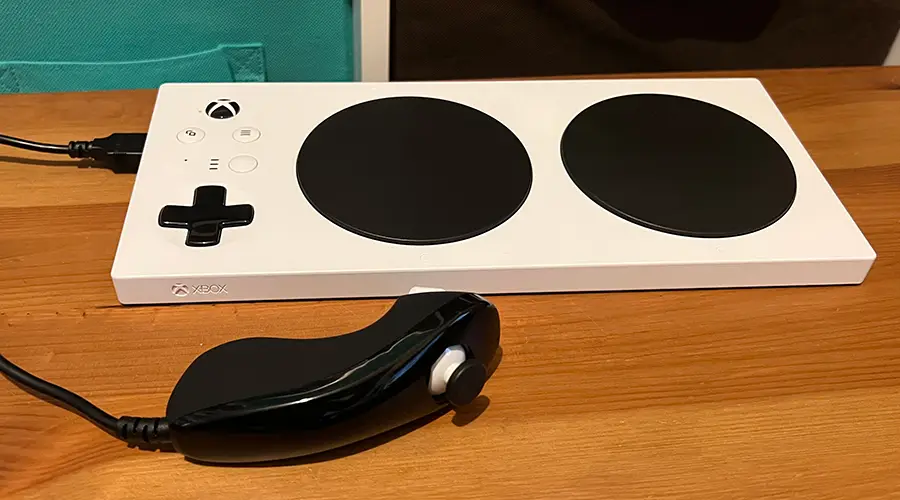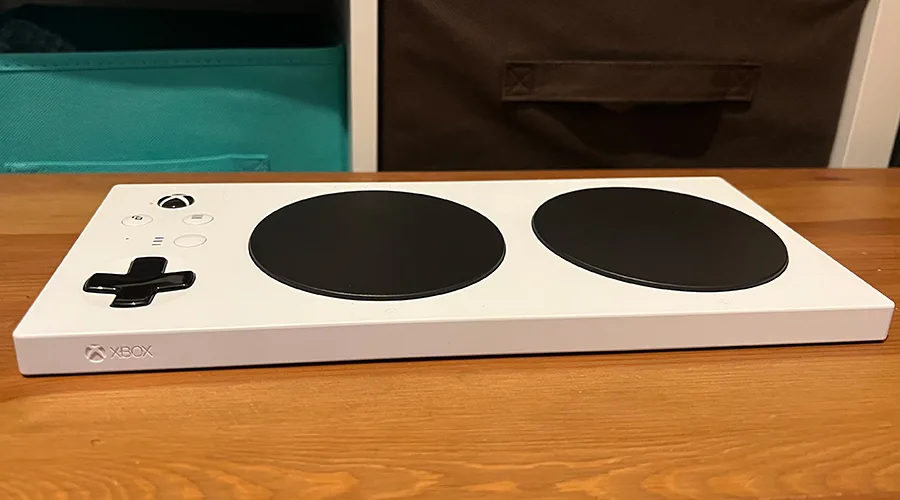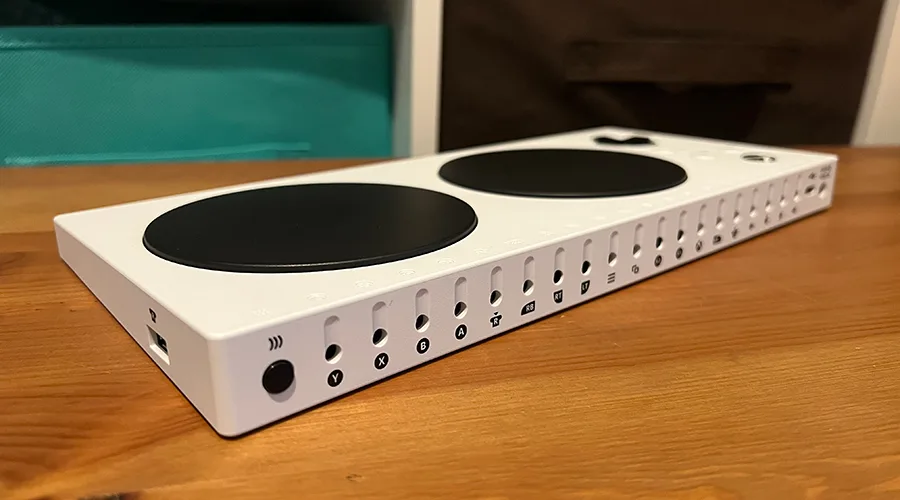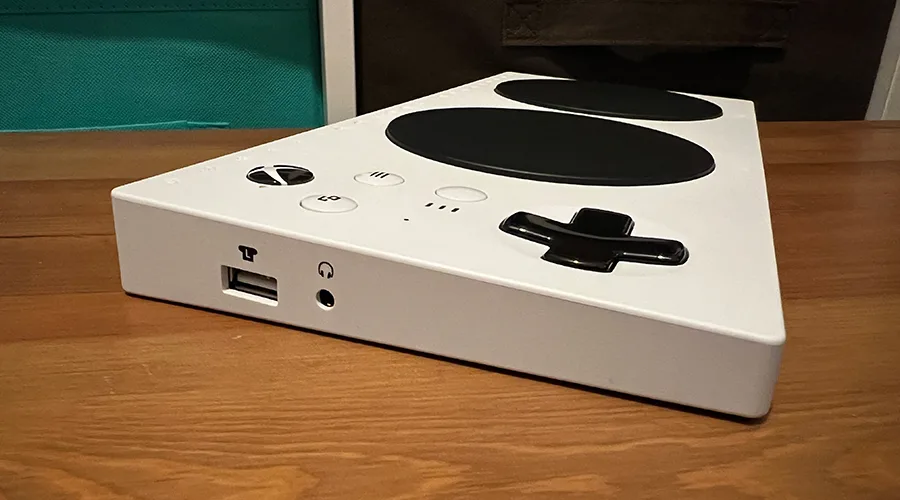Xbox Adaptive Controller review: Incredible potential for every gamer
Summary
Quick verdict: The Xbox Adaptive Controller is an exceptional and incredibly inclusive hardware controller, and an idea that the rest of the gaming industry should have supported more than it has.
- Configurable for a wide variety of ability needs
- Works across Xbox and PC
- Durable design
- Configuration and fine tuning will take serious time
- Could be quite costly if you don’t already have disability controllers to plug into it
- Limited buttons on base unit
PC and console gamers have a huge array of choices when it comes to picking their control method of choice, from standard game controllers to mouse and keyboard, flight sticks to steering wheels and plenty more besides.
However, the choices slim down massively if you have any degree of physical disability. For years, gamers who could not manipulate standard controllers were left mostly out in the cold, with just a few options to navigate the gaming landscape and essentially no support from the gaming mainstream. Making a controller that would work for even a limited subset of disabilities is a serious challenge for anyone, let alone a controller that would work for everyone.
Enter Microsoft's Xbox Adaptive Controller. While it's been on the market for a few years now, it's still absolutely the gold standard when it comes to truly accessible controllers, showing everyone else how it should be done.
It's a pity that other big game makers – yes, Sony and Nintendo, I'm looking straight at you – haven't come to the party, but that doesn't take away from the immensity of Microsoft's achievements and ambition here. The Xbox Adaptive Controller probably just costs money for Microsoft to make and sell, but they did it anyway, and that's just plain excellent.
Design: Simple, durable and immensely configurable

Image: Alex Kidman/Finder
Describing the Xbox Adaptive Controller is very easy. It's a big white slab controller that looks vaguely reminiscent of some early arcade joystick controllers, and especially the pressure-sensitive buttons that were part of Street Fighter's original arcade layout. Not Street Fighter II – the earlier one that hasn't aged well at all. But I digress.
On the face of the controller, it's got huge round primary buttons taking up most of the controller space, with a large d-pad to the left, as well as buttons for switching profiles, standard menu and share buttons and a large white Xbox button, used as usual to indicate connection status.
The beauty of the Xbox Adaptive Controller doesn't lie in those face controls, although it's notable that the primary buttons are really quite durable. I'm very confident that I'm not the first reviewer to take the particular model of the Adaptive Controller I tested out for a spin, but it held up to any number of thumps and bumps during my review process without issue. It's built to last, folks.
Where the Xbox Adaptive Controller tries to be all things to everyone is at the rear, where basically every single Xbox control input – sticks, buttons, the whole lot – is represented by a row of 19 3.5mm inputs.
The idea here is that if you've got a disability controller that terminates in a 3.5mm jack, you can plug it into the Xbox Adaptive Controller, configure it through the app and then use it to play the game of your choice. That could be a button, a dial, a lever – it very much depends on the specific disability need of the user.

Image: Alex Kidman/Finder
The Xbox Adaptive Controller also has 2 USB ports on its sides, for connecting other USB-centric devices. Microsoft loaned me an Xbox One Handed Joystick that it also sells for those gamers who could find use in one. The easiest way to explain that is that it's a Wii Nunchuck, sans Nintendo logos.
It works well enough, although while researching I did find a considerable number of complaints from gamers that it can be very hard to find in stock anywhere. For what it's worth, I couldn't find it anywhere on the Microsoft Australia store, and the US store simply sadly said that it was out of stock, with no indication of when or if it was going to be replenished there.
Performance: Game changing, but not without its challenges

Image: Alex Kidman/Finder
Assessing the Xbox Adaptive Controller is one of the hardest review challenges I've ever taken on, for 2 primary reasons.
Firstly, I'm an able-bodied gamer, and I'm 100% well aware that I cannot (and should not) speak for every gamer with a disability out there.
The needs are so very diverse in this case, and there's just no way to adequately test for every use case scenario.
As a parent of a child with a disability, I'm perhaps more aware of that than some, but it's not an identical scenario by any stretch of the imagination.
The other factor that makes the Xbox Adaptive Controller tricky to assess is that it's such an open platform.
That's absolutely its strength, because it can easily be configured to meet a myriad of needs and control inputs. There's even scope here for what Microsoft calls Co-Pilot mode, pairing up multiple controllers – these could be presumably 2 Adaptive Controllers or 1 Adaptive and 1 standard or Elite controller – as though they were a single controller. Like I said, flexibility here is off the charts.
However, that also means that any assessment is more going to reflect the quality of those external controls than just the bare Xbox Adaptive Controller board itself.
That does invite a rather obvious problem for gamers with disabilities with the Xbox Adaptive Controller. Because its core controls are so limited, just buying the Xbox Adaptive Controller by itself isn't going to be much good for playing games more complex than Pac-Man.
Nothing wrong with Namco's eternally hungry mascot, but gamers do want more than just his chomping action to play along with.

Image: Alex Kidman/Finder
That's going to invite additional cost, and depending on your precise needs that could ramp up quite markedly.
I tested with just the Xbox Adaptive Controller and the One Handed Joystick, and that did limit the scope of my testing, just as limited funds might constrain how a gamer with disabilities may be able to make the most of the controller itself.
That being said, the core hardware is very solid. Playing through games like the amazing A Short Hike, which doesn't need fast response to speak of, I could quickly lose myself in the game even though the controls were very different to my own typical expectations. Switching up to more challenging fare quickly revealed the limits of the controls available to me, but that doesn't take away from what the Xbox Adaptive Controller could be with a few extra inputs and the desire to make it happen.
Again, this isn't about me, because I'm not the core market, but I couldn't help but grin as the realisation grew on me that this is exactly the point. Opening up gaming to more gamers is a laudable matter, end of story.
If I've got any criticism of Microsoft here, it's that it doesn't seem to have iterated on the Xbox Adaptive Controller in any appreciable way since its launch several years ago.
Sticking to a hardware platform isn't a bad thing, but it doesn't mean that Microsoft should rest on its laurels. A smaller model, or one that switches out the larger buttons for other use cases could be welcome, for a start, as would more regularly stocking the accessories that can make the most of it.
Should you buy the Xbox Adaptive Controller?
- Buy it if you want in on the gaming world and conventional controllers will not work for you.
- Don't buy it if you lack the patience for configuration or the funds for additional controls.
The Xbox Adaptive Controller remains an amazing and laudable effort from Microsoft to bring gaming to an even wider array of people than could access it beforehand.
It's not flawless. Price is going to be a tricky matter for many gamers to manage, especially when you consider the add-on cost of the extra controls needed to make the Xbox Adaptive Controller shine for specific use cases. Configuration takes time and patience, and its size alone could present challenges for some gamers, while providing opportunity to others.
Still, it's an amazing controller unlike any other.
Pricing and availability

Specifications
How we tested
The Xbox Adaptive Controller used for this review was loaned to me by Microsoft for testing purposes. I tested on an Xbox Series X and a desktop PC running Windows 11, using the Xbox Accessories app to configure the controls available to me for assessment purposes.
The reviewer has more than 2 decades of tech product reviewing under his belt and is a multi-time Australian IT Journalist award winner, including awards for best reviewer and best technical journalist.
